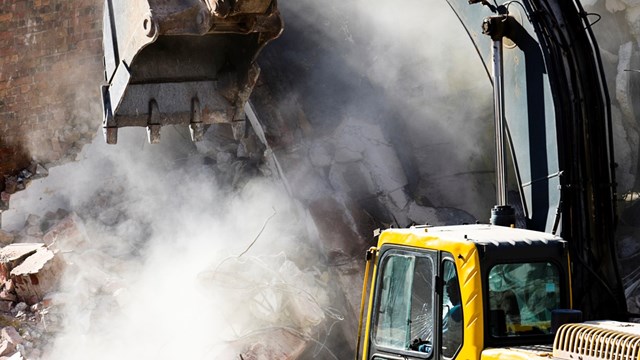Time was, when you had a big construction or renovation job, you hired a general contractor, and if the job was big enough, that contractor hired subcontractors.
But in recent decades, a new player has entered into the process, helping with not just individual projects, but building-wide and multi-building jobs: the construction manager. The “CM” as he or she is often known, takes pressure off owners and managers by overseeing the job and coordinating between contractors, HOA administrators, and sometimes even residents. The Construction Management Association of America (CMAA), a nationwide organization headquartered in McLean, Virginia, outlines a construction manager’s responsibilities to include project management planning, cost management, safety management, contract administration, and quality control.
What They Do
These functions of a construction or project manager can be further broken down to include developing and directing a formal construction management plan, organizing and leading a project team, developing project budgets and cash flow, reviewing design documents, keeping abreast of related legislation and workers’ compensation law, and monitoring workers' compliance with job site protocols.
"This is the point person who deals with project and representing the owner," says Luis Menendez, CCE, CCM, PMP, president of Trigon Construction Management, Inc., in Upper Montclair. "The construction manager is an agent of the owner and is someone who has the background and expertise to manage the construction process. They can come from any discipline, including architecture, engineering or something completely outside the two."
"There are a lot of different uses of the term project or construction management," says John Colagrande, vice president of engineering for The Whitman Companies in East Brunswick. "The terms are often used interchangeably. A construction or project manager is hired to oversee exterior renovation, coordinate with contractors, facilitate local permitting, and review change orders on behalf of a client. A lot of times, a board does not have anyone who is competent in that area of work or who has the time to do it, so it's in your best interest to hire someone to represent you with the contractor," he says. "This is your representative at the construction site. Most construction managers have spent a lot of time doing construction work and have a background in it. They are able to share their experience and knowledge with their clients."
Selecting a CM
Make no mistake, say the pros: a competent, reputable general contractor is certainly capable of running a job smoothly – and not every project calls for a CM's expertise. But at times, having a CM on hand to oversee the project for cost, quality and adherence to schedule can add a layer of security for HOAs.
Obviously using a CM also adds to a project's price tag—so it's important for HOA boards and managers to consider whether or not their particular project would benefit from having some professional oversight and management. There can be many reasons why the answer might be yes, including the size of the project or HOA, the duration of the project, and its cost and complexity.
But once you’ve determined that your project calls for a construction manager, how does the selection process start? John McKeon, vice president in charge of communications for the CMAA, says that CMs should be selected by a qualifications-based selection process.
“Typically,” he says, “there’s a two-stage selection process in which bidders are evaluated based on experience, technical expertise and qualifications—then cost is determined in a separate negotiation with the bidders identified as best qualified.”
Most construction managers come to the field from an engineering or a contracting background, but some start their careers as architects, and still others are also licensed contractors who now specialize in construction management. Some CMs actually have specific degrees in construction management as well.
It may be useful to note that some of the larger property management firms in the city have their own construction managers on staff, or even an entire construction division to help out their co-op and condo clients. Most of the time however, management companies go through the same selection process for a CM as any other vendor or service provider. Of course, organizations like CMAA can help—they have regional chapters, including one for the New Jersey metro area.
Orchestrating the Process
So, say, you’ve hired a construction manager for the job. How and when does he or she come onto the project? Most professionals agree that the CM's involvement should come before the general contractor's. Before the first hammer-swing, construction managers can help with the bidding and selection process, as well as handling the contracts themselves. In fact, says one condo attorney, when an association hires a construction manager, there may not even be a general contractor. “There may be a construction manager and a bunch of contractors,” she says. “The CM may help the HOA solicit bids from a variety of trades and help the association get a better price.”
Whatever his or her other responsibilities, a construction manager is obviously expected to visit the project site, says McKeon – though how often depends on the CM's contract and the scope of the job. Some projects may require the CM to be on-hand every day, whereas others can be managed with one visit a week. How many projects one construction manager can handle also depends on the particular jobs involved. If it's two projects a half-mile from each other, that may work swimmingly. If two concurrent jobs are several counties apart, it may not.
They Pay For Themselves
Now, we get to one of the main factors of concern to boards or managers considering hiring a construction manager: price. As with projects themselves, it varies. McKeon says that the CM will typically be paid a percentage of the project’s initial budget. “We did a survey back in 2007 that found these fees ranged between 3.8 and 6.9 percent of the total cost, varying by geographic region, type of construction, etc.,” he says.
The percentage-of-total model isn't universal, however – and neither are the percentages themselves. Some construction managers are paid a flat rate, others by the hour, and others by project duration. The CM's percentage may also be higher in more expensive markets – for instance, one source estimates construction managers' fees in
New York City can be as high as eight or even 10 percent of the project's cost.
On the subject of whether hiring a construction manager is worth it, McKeon believes that a good construction manager can “pay for himself” by making the work go more smoothly, keeping workers on schedule and curbing waste. “Our position is that working with a CM is going to result in a smoother project that finishes on time and on budget, with fewer change orders, fewer disputes, and less risk of litigation,” he says.
In addition to overseeing the work, construction managers can also manage the books and records, issue payments and review change orders. They also keep the owners up to speed on how the project is progressing and coordinate loose ends.
"Cost, or the perception that they would be saving money, is probably the primary reason people opt to go without a construction manager," says Gary Coopersmith, vice president of Sweetwater Construction Corp. in Cranbury. "What they don't realize is that most good construction management firms can bring a level of competition to the table, bringing in lower costs to the project. Even with the fee on top of it, it will result in a lower cost overall."
Coopersmith goes on to say that "The other benefit when you hire a construction manager is that when the construction manager goes to the base of subcontractors, there's a high level of commitment of those subs to the construction manager. Because the subs rely on the construction manager for future business, they're more apt to show up and not delay things.”
Some large management companies may keep a list of construction managers they’ve already worked with. If this isn’t true in your case, other professionals may be able to recommend one. In addition, the CMAA’s web site offers a “Find-a-CM” database searchable by geographic location.
On the Job
On the job, "Most construction managers use scheduling tools and software where you have at least weekly goals and milestones that need to be achieved on the project. They thoroughly review the project with specialty trades and establish schedule based on the different people whoa re involved. The project manager would ensure that subs are doing their jobs," says Ronald Witt, Sweetwater's chief executive officer. If contractors or subcontractors have fallen behind or have not completed parts of the project on time, a project manager can intervene and get things back on track, or might also make suggestions to the association's administration of actions they might take, such as withholding payment until agreed-upon standards and timetables are met.
At the end of the day, "If you have a board member who is construction-savvy and has the time, or if you have a contractor you've used for 10 years, you don't always need to hire a manager," says Colagrande. "If you have [a particular contractor] you've used in the past and you've had no problems and trust that person, you don't really need someone out there working with them. But if you don't have that comfort level, and you're bidding the job out, it's in your best interest to have someone out there watching the project for quality control. A project manager can be a second set of eyes on your behalf, looking out for your association's best interest."
Raanan Geberer is a freelance writer, editor, and a frequent contributor to The New Jersey Cooperator.







Leave a Comment